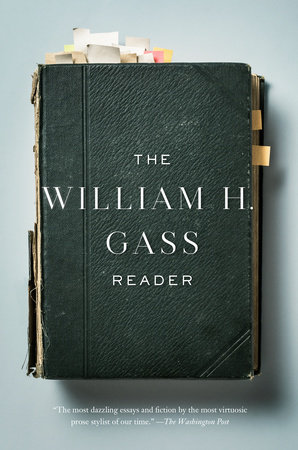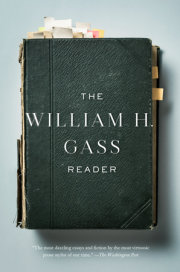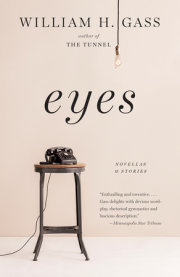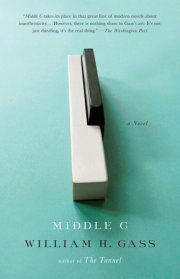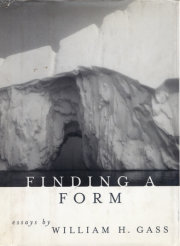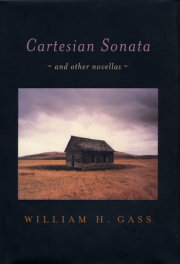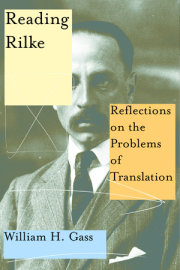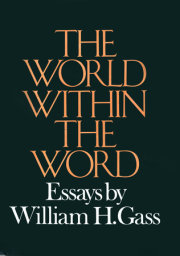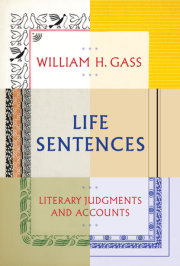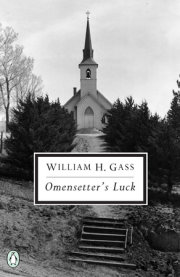Excerpted from "Retrospection" “Don’t look back,” Satchel Paige is supposed to have said; “someone may be gaining on you.” Don’t look back, Orpheus was advised; you may find your earlier poems better than the ones you will write tomorrow. Lot’s wife looked back at Sodom and was so shaken by the sight of the Red Sea swallowing the city she became salt. Look back only if the mess you have made of your life leaves you eager to reach a future that will offer a fairer prospect. Otherwise cover your eyes before blame blinds them the way Oedipus’s pin put out his. However, Paul Valéry warns us that no one “can deliberately walk away from any object without casting a backward glance to make sure he is walking away from it.”
For anyone who has reached eighty-seven years, as I have, only the past is likely to have much duration; greed and regret will have eaten the present, which is at best a sliver of cake too small for its plate, while the future fears it may cease before having been. I hear it running to get here, its labored breathing like an old man—eighty-seven—on the stairs. Lust and rage, Yeats rightly said, attend one’s old age.
So it is in a spirit of disobedience that I look back at what I may have done rather than toward all that remains to be encountered, coped with, perhaps yet accomplished. I say, “may have done” because what one has really done is never clear and certainly never comforting. Rarely does one say, “I may have married her but only time will tell.”
Your station in the literary world, whatever that might be, does not matter much if you’ve spent your life chasing words with Nabokov’s net. That’s still where the results of your life went, into the killing jar, sentenced to a verbal smother, pinned in place, a display that’s initially a cause of mild indifference, and then evermore ignored.
Looking back I find it less painful to concentrate on the kind of thing that concerned me, rather than on the messes I made or on the few fragile triumphs I may have enjoyed. Looking back I find I fit the epitaph Howard Nemerov once wrote for himself in Gnomes and Occasions (1973).
Of the Great World he knew not much, But his Muse let little in language escape her. Friends sigh and say of him, poor wretch, He was a good writer, on paper. It turns out that these preoccupations, these bad habits, these quirks number at least seven, though I am sure I am ignoring the ones that really matter. They are: naming, metaphoring, jingling, preaching, theorizing, celebrating, translating.
First: naming.
Critics still write of me as if my interest in words was an aberration. Yet Adam’s task has always seemed to me to be, for a writer, the central one: to name, and in that way to know. It wasn’t true for Adam, for whom all names were fresher than the daisy, but it is true for us now: a name no longer merely points something out and distinguishes it in that manner from the rest of the world; every name stands for all that has been thought, felt, said, perceived, and imagined about its referent, and represents all that has been discovered during explorations of its indigenous concepts during two thousand years. And since we humans have the deplorable yet entrancing habit of naming things that do not exist, the realm of names is larger than the realm of things as much as the population of China exceeds that of New York State. This passage about naming trees comes from my first novel, Omensetter’s Luck (New York: New American Library, 1966), and concerns my unfortunate character Henry Pimber, who will end up hanging himself from one of the branches of the trees he sings about.
The path took Henry Pimber past the slag across the meadow creek where his only hornbeam hardened slowly in the southern shadow of the ridge and the trees of the separating wood began in rows as the lean road in his dream began, narrowing to nothing in the blank horizon, for train rails narrow behind anybody’s journey; and he named them as he passed them: elm, oak, hazel, larch and chestnut tree, as though he might have been the fallen Adam passing them and calling out their soft familiar names, as though familiar names might make some friends for him by being spoken to the unfamiliar and unfriendly world which he was told had been his paradise. In God’s name, when was that? When had that been? For he had hated every day he’d lived. Ash, birch, maple. Every day he thought would last forever, and the night forever, and the dawn drag eternally another long and empty day to light forever; yet they sped away, the day, the night clicked past as he walked by the creek by the hornbeam tree, the elders, sorrels, cedars and the fir; for as he named them, sounding their soft names in his lonely skull, the fire of fall was on them, and he named the days he’d lost. It was still sorrowful to die. Eternity, for them, had ended. And he would fall, when it came his time, like an unseen leaf, the bud that was the glory of his birth forgot before remembered. He named the aspen, beech, and willow, and he said aloud the locust when he saw it leafless like a battlefield. In God’s name, when was that? When had that been?
I have never been able to break the denominating habit. In a relatively recent piece, “Emma Enters a Sentence of Elizabeth Bishop’s,” I managed to cram the names of 110 weeds into one paragraph.
Writing has almost always been difficult for me, something I had to do to remain sane, yet never satisfying in any ordinary sense, certainly never exhilarating, and never an activity that might satisfy Socrates’ admonition to find a Logos for my life, as I felt it surely had for the authors I admired: even Malcolm Lowry’s dissolutely drunken sprees; even Hart Crane’s beatings at the hands of sailors, beatings he sought out as he ultimately sought the sea; even Céline’s meanness, a bitterness that ate through his heart before it got to his shoes and ate them too; even these malcontents, though nothing justified their wasted ways, their anger, their multiplication of pain, might be, by their works, somewhat saved, their sins hidden under sublime blots of printers’ ink.
Number two: whoring and metaphoring.
One aspect of writing was easy, was unstoppable, and that was the flow of imagery that ran through my head like a creek in flood—no—like the babble of voices around a bar at happy hour—no—like a stream of ants toward a source of sugar—oh, no—like carp rise to a dimple of bread—oh, no—oh, no—a cloud of gnats—a giggle when tickled. An attack of bats. I could swat away six and still write eight. It was a curse disguised as a blessing. I was always looking at the world from another word. The wolf spider roams at night from field to field in search of prey, while the mantis sits still as a twig by a flower’s sweetened cup until some sucker comes to nose it, and then she, the madam mantis, sups. But these facts interested me mainly because I knew people like that. I was one—a waiter—the sort of waiter who is always looking the other way. So I wanted, when I named a tree, to invoke a plant equal to every phase the plant had seen. I didn’t simply want to make a tree with roots, bark, branches, trunk, twigs, nesting birds, needles, and leaves; I wanted to imagine ones that were telly poles too, bore lynch limbs, and had branches to which possums were driven by packs of unpleasant dogs; I wanted trees with doors in them, clothes trees where dress suits were hung; trees that had family histories dangling from their diagrams.
I am not observant of persons, so if I imagine someone whose skin is as smooth and pale as a grocery mushroom, it is the mushroom that did it. Among the thousands of my photographs there may be three (the fairy-tale number) that misinclude people, and even then they look like barely promising piles of rags. Recently, in an essay on François Rabelais, I wrote that while his work looked woolly, its sense was consistent, unified, pure yet iridescent, as though silk had swallowed water. That last image was a simple pun on watered silk that let me gloat a quarter of an hour before its time on the meter was up.
I am an octogenarian now and should know better, but I recently let a sentence reach print so embarrassingly bad its metaphors seemed frightened into scattered flight like quail. I meant to shame myself by reciting it to you, but I find I cannot, sparing myself, not you. Instead I’ll quote something that’s perhaps passable, from a story called “Order of Insects” in the collection In the Heart of the Heart of the Country (New York: Harper & Row, 1968). For this piece I did indeed study cockroaches, and came to admire them immensely (few humans measure up: haven’t the humility, the wiles, the longevity or body armor, the moves), but it was as a metaphor made into a symbol that I wanted to use them. A housewife, who narrates the story, has begun finding dead roaches on her downstairs carpet in the morning, apparently killed by her murderously playful cat. As she inspects them she finds a beauty in their construction that imperils her opinion of her own life. She wonders what would happen if we wore our skeletons on the outside, like a costume for Halloween, and concludes this way:
I suspect that if we were as familiar with our bones as with our skin, we’d never bury dead but shrine them in their rooms, arranged as we might like to find them on a visit; and our enemies, if we could steal their bodies from the battle sites, would be museumed as they died, the steel still eloquent in their sides, their metal hats askew, the protective toes of their shoes unworn, and friend and enemy would be so wondrously historical that in a hundred years we’d find the jaws still hung for the same speech and all the parts we spent our life with tilted as they always were—rib cage, collar, skull—still repetitious, still defiant, angel light, still worthy of memorial and affection. After all, what does it mean to say that when our cat has bitten through the shell and put confusion in the pulp, the life goes out of them? Alas, for us, I want to cry, our bones are secret, showing last, so we must love what perishes: the muscles and the waters and the fats. Number three: jingling.
When you are a cowed and confused kid you say to the stupid question grown-ups always ask with such condescension that you want to bruise their shins: I hope to be a fireman when I grow up. But of course you really want to be a poet. Everyone wants to be a poet. It is the beckoning inaccessible peak. How many poets have told us? At twelve I wrote awful Edgar Allan Poe, much as Poe had—jingle all the way; at fourteen I was as interminable as Walt Whitman; I extolled the groceries and made lists of buffalo hunters and Indian scouts. I did patriotism, I’m ashamed to say, and praised mothers. My God, I was even against drink. Most of all, what I wrote was bad. Not just youthful. Not just undisciplined. Bad beyond excuse. After years of futile wondering, I think I now know why. My irreverence, my hatred for authority, my distrust of tradition, my enjoyment of the comforts of middle-class life and my contempt for its philistine values, my habitual “up yours” and “in your eye” attitude, also inhibited my ability to absorb conventional poetic forms. Instead I was attracted to the urchins among them, indecorous lines and unruly stanzas. Ezra Pound, an early hero, too melodious and poetical by half much of the time, would nevertheless burst out, to my delight, with, “Damn it all! all this our South stinks peace,” a sestina in praise of bloodshed and war, while at other times condemn such belligerence, as he does in Hugh Selwyn Mauberley’s unforgiving anger at the First World War:
There died a myriad, And of the best, among them, For an old bitch gone in the teeth, For a botched civilization. . . . Or when, in the same poem, he wrote that “his true Penelope was Flaubert,” I was immediately moved, because Flaubert has always been my favorite hater, and I was grateful to Pound too, though absurdly, because he was the first poet I knew to use the word fucking in a poem. Even if they were panthers that were up to it.
I despised pop tunes, yet I imbibed their forms. When Gertrude Stein wrote: “I am Rose, my eyes are blue, I am Rose and who are you? I am Rose, and when I sing, I am Rose like anything,” I was perhaps more pleased than was reasonable. I practiced the limerick in secret and dallied with other cheapjack devices. My career as a poet ended in doggerel and japery. Yet I found a use to which I might put them—these dogs. For my novel The Tunnel (New York: Knopf, 1995), I invented a historian named Culp, whose subject, I meanly said, was the American Indian, and I claimed that he was energetically engaged in writing a limerickal history of the world, as well as a cycle of such rhymes that shared the same first line: “I once went to bed with a nun.” I got good at it—at the limerick, I mean—and began to do to it what I couldn’t do to the sonnet—torture its type.
Copyright © 2018 by William H. Gass. All rights reserved. No part of this excerpt may be reproduced or reprinted without permission in writing from the publisher.

